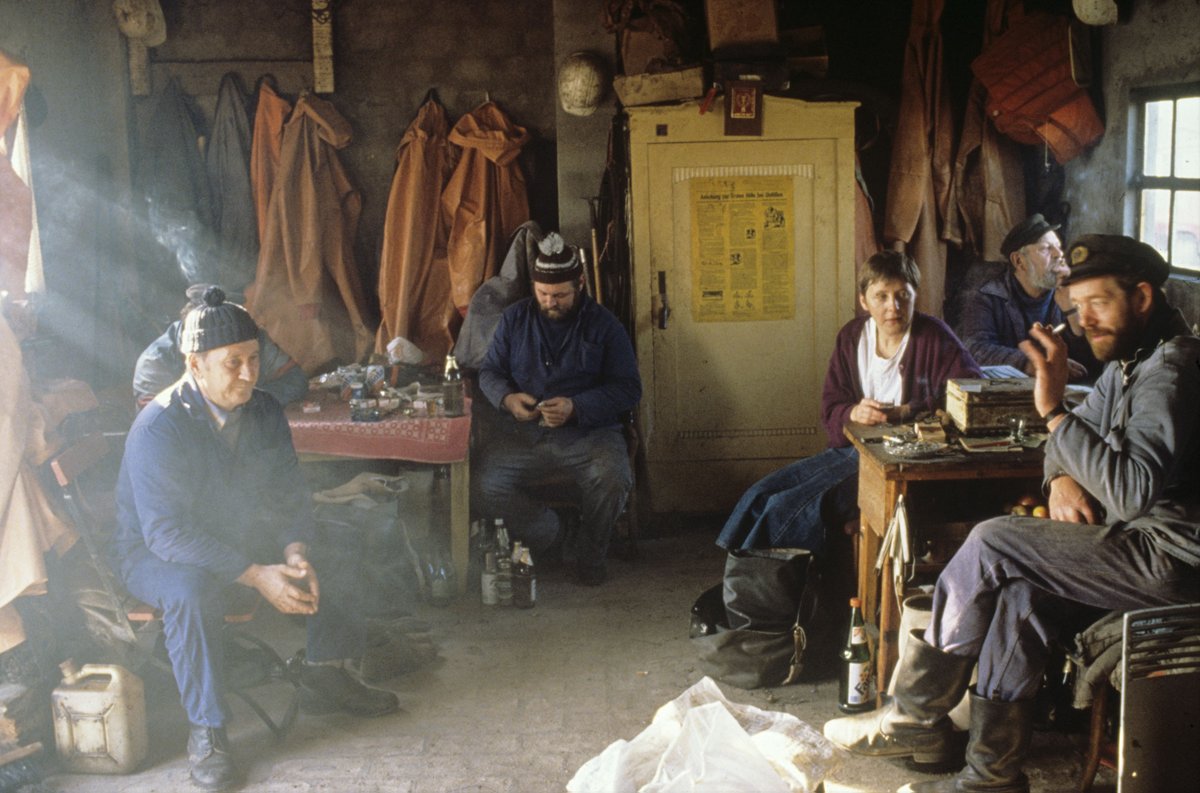It gets better. We tell our teens that but it is a bit hard to believe sometimes. Like in a pandemic exiting its second year when the sun is well below the horizon. But there’s only a few weeks of this darkness and there is beauty all around even in these troubled times. Up there? That’s Angela Merkel, in November 1990, at 36 campaigning on the Baltic coast in Germany’s first election after reunification. Fabulous. She reportedly drank five schnapps with them. As discussed in early 2019, Merkel has always been handy with a beer glass. I probably disagree with most of her politics but that presence and style will be missed. She strikes me as an excellent example. Do what needs doing. My mother would say that: “it just takes doing.”
There. A bit of positivity. Let’s keep it going until we can’t.  First up, I loved this duo of tweets, each of which is oblivious to the other. One, a map of the inns of Southwarke England circa 1550. The other?
First up, I loved this duo of tweets, each of which is oblivious to the other. One, a map of the inns of Southwarke England circa 1550. The other?
What a thrill to discover a 17th C traders token in the Thames mud from the Bell, a tavern mentioned by Chaucer at the beginning of the Canterbury Tales as being close to the Tabard where him & the pilgrims met en route to Thomas Becket’s Shrine in Canterbury.
The Bell and the Tabard are both on the map. Neato. Also neato was an excellent piece that I missed last week by Evan Rail on the problem of appropriation of Indigenous matters in beer branding as well as some very fundamental misunderstandings:
“I can only speak from my point of view, and my point of view is that we—meaning society—mistakenly think of Native Americans as a race,” Keyes says. “And what we’ve got to remember is that each of these tribes individually are sovereign nations. They have their government entities. And every tribe has its different culture. Not all tribes are just a Native American culture that’s the same.”
Getting thing wrong is always central to bigotry. The bigot always wants to control the narrative. This all particularly caught my eye as I am also in a family with Indigenous members and work with Indigenous governments as part of my work. And what mystifies me about the bigots is how they miss how fascinatingly rich Indigenous culture actually is. This article also caught my eye as this very week I had to give the heads up to another major brewing publication that it had very recently published that same very derogatory racist obscenity that Evan discussed in that recent piece. Happily, it was immediately removed – and was removed with thanks.
Also, see this post from the Oregon Hops and Brewing Archives about a very specific question on the similarity among brewing competitors advertising a century ago:
I’m left with some lingering questions, the biggest being these: did these two breweries hire an advertising firm, did the newspaper have this book and create the advertisements, or did the brewery have a book of phrases they chose from? My sense is that the book is for a newspaper, given the instructions for setting up a printing machine and information about inks in the latter part of the book.
Conversely perhaps, did you know that Instagram may hate beer? How about these these outfits? Do you like them? No? Me neither, but I do like honest tasting notes:
I think perhaps if I have a lifetime of connections like this I can handle a lifetime of being told my tasting notes are too personal, that who I am is wrong, of failing future wine exams. I think perhaps, if anything, I will make it more so.
That makes much more sense that a concept limiter, the expertise in narrowing – like a little wheel. Look at that: water’s contribution is actually a binary. A toggle switch. Little good comes of toggle switch understandings. No, no need of that. Stretch your own arms wide, as wide as you can. There was an exceptionally fine example of this in terms of personal tasting in Kate Bernot’s best beers of 2021 as published in (Craft) Beer & Brewing mag. Consider this:
The aroma promises an herbal, not-too-sweet blend of licorice, Tootsie Roll, star anise, gingerbread, and dark cocoa, while the flavor delivers bigger fruit that lends a cherry-cordial and Black Forest–cake impression. It’s like dessert and digestif in one. Gorgeous.
Impression! Less of the style guide references or list of ingredient and more of the personal and taste memories. Good. It’s my personal approach, too. Along with this.* Don’t be sucked in by the actual negs, the forces of poor widdle cwaft. You be you.
In other news, the beer writers of Britain gave each other** awards this week. It lead to some unhappiness and subdued response to that was offered: “The bigger story here tho is how many new writers were recognised for first time in these awards.” In another sort of awarding, Ron finished up his fun in Brazil with a few more interesting and honest notes about the integrity of the process:
“What will we be judging today? We already awarded medals yesterday.” I ask Gordon over breakfast. “Not all the categories have been judged yet.”
You quickly see from Ron’s posts that they center on styles and that styles are more like a skills competition as opposed to playing the actual game. In addition to judging submissions after awards have been given, we also learn that the best may be rejected if they are not fitting into that square peg of style. What’s that about? So much for best of show. Surely, not great.
The process of awarding awards is often a funny thing. Consider Drake’s actions this week to remove himself from the Grammys. People think I am just a bit of a crank about these things but it isn’t so. I do this for a living. Let me tell you something about myself. As part of my work, I oversee and advise upon many aspects of the process and substance of awarding contracts at a very high level, for up to nine figure procurements. I buy things bigger and more complex than very large craft breweries. Right down to the details. I have worked with engineers to draft specifications for evaluating grades of steel that consider the stages from the fabricator back to the steel mill back to even the mines where the ores were dug. I love it. And those experiences inform these other experiences. Which leads me to the observation that I would not select the award of a pencil supply based on the process Rob described. It’s like folk are just making stuff up!***
We need to pay attention. These sorts of awards that Ron participated in are based on the construct of style. Which is really little different from the characteristics of the various concretes or the range of coverages one needs to consider to ensure the proper sort of workers compensation policy is acquired for a particular job. All of which is timely as the question of style keeps on giving and, weirdly, not one opinion seems to be the same… even when – and perhaps especially when – people think they agree with each other. Only for example, let’s start with Boak and Bailey who approved this comment from Stan’s summary of the situation:
What a frustrating discourse! It is pretty obvious that it is helpful and sometimes demystifying to categorize beers by style. It is also obvious that some people police the style taxonomy in a way that is off-putting and hostile to outsiders.
Oh, simple comment maker. It isn’t that at all. Nothing is binary. And nothing is obviously obvious. No, we can ignore that. “Get a therapist!” says one Aristotelian. Another thoughtful person, who loves the whole thing so much they seem to really want an end to all beer – even for the best of reasons – didn’t like the idea that style is even being discussed.**** But discussed it has been. Lesson: ignore folk who tell you to shut up.
 Next, the call that everything is great. Think William Blake, “All Religions Are One” for a mo. Maybe that’s it. So “Drink what you like!” we are told, conversely. We are told style and those who define it are gatekeeping and that this “reinforces the negative stereotypes of the industry.” That may be a very good argument with a very good goal – exploration and inclusion. Other cultures can be actually wonderfully enriching. But, as we see to the up and the right, that can lead to appropriations, circumstances where anything in a can can mean anything now. Nothing demystifying about that. Just a blurrier blur.
Next, the call that everything is great. Think William Blake, “All Religions Are One” for a mo. Maybe that’s it. So “Drink what you like!” we are told, conversely. We are told style and those who define it are gatekeeping and that this “reinforces the negative stereotypes of the industry.” That may be a very good argument with a very good goal – exploration and inclusion. Other cultures can be actually wonderfully enriching. But, as we see to the up and the right, that can lead to appropriations, circumstances where anything in a can can mean anything now. Nothing demystifying about that. Just a blurrier blur.
So, we have these structures and they help us to avoid the blur. We see, accordingly, Mr. B declared his entire agreement with Garrett Oliver when he rightly and righteously proclaimed:
…[he] says quite simply something I’ve been ranting about — hello, IPA category! — literally for years. Words matter. Styles matter. Expectations based upon words and styles on a label matter…”
…err… right before Mr. Oliver wrote a significantly but not entirely different thing:
Brewers can – and should – call beers whatever they want to. What I want is for brewers to WANT to hold the line on some things. I don’t think calling a deep amber beer “Pilsner” is good for customers or for brewers. That said, in the end…self-respect is always voluntary…
Voluntary. Which raises a point: really? When is a rule voluntary? If style is so central to understanding beer why can it be applied or not applied here and there however folk want. Should it be voluntary? Jings. What ever did the poor folk do before the early 1990s when the concept was invented? Were they happy? Were they maybe happier?
No wonder folk throw up their hands. It wasn’t always so. I came across a voice from the past this week, echoes of the past in something called Brewing & Beverage Industries Business magazine in which you can learn (on page 8) that folk today lack a proper understanding of brown bitter: “…balance in beer, how very uncraft…” You can also learn (on page 10) that folk today lack a proper understanding of Belgian beer:
I remain convinced that, were you to package them differently, or present them already poured rather than in the bottle most younger drinker (sic) would be every bit as enthusiastic about them as they are about Brewery X’s new bourbon barrel-aged Imperial porter or Y Brewing’s guava milkshake IPA…
See, it’s all their fault. Folk who don’t get it. The “younger drinker”! Can we tie that argument all together: awards now suck because the disfunction of style sucks because new craft sucks because young people who want new craft today… suck? Really? Isn’t something else the problem? Hasn’t uncontrolled style division and propagation as a top down exercise itself caused craft’s cacophony as opposed to clarifying anything? Who pushed that propagation of sub-style after sub-style? Those who benefit from manufactured complexity. And who is that? Surely not the reader of a well thumbed copy of Modern British Beer.
What to make of these ye oldie fartie views? Are they the last bastion of the fight against all these young people***** and all these strange tastes? There are a lot of strange tastes going around, it’s true. There ought to be a limit. Or at least proper labelling. Which leads to one last thing, that I think I would be more concerned about supply chain issues if the supply on the chain were not lychee:
His shipment never left Southeast Asia, posing big problems for Urban Artifact’s Petroglyph beer, a top seller. But then, Kollman found a different supplier who already had a container of lychee sitting at the Port of Los Angeles. A lychee lifeline? Not so fast. “Two and a half months later, that [order] never left the port” either, Kollman tells me in a recent phone interview. “So we just dropped that product line.”
If the lychee supply fails, drop the product line. Make something else. Because the next thing is just as good as the last. Transitory. So lacking of structure that the next fruit flavour that comes along is tomorrow’s darling. Somewhere eight or ten years ago, did we see this coming? Isn’t it like a culture that we have just encountered for the first time – even though it’s been there all along? What do we call this anti-style thing? Is it just… fun?
As you think about that over the week, please also check out the updates from Boak and Bailey mostly every Saturday and from Stan every Monday, plus more with the weekly Beer Ladies Podcast, and at the weekly OCBG Podcast on Tuesday and sometimes on a Friday posts at The Fizz as well. There is a monthly sort of round up at The Glass. (Or is that dead now?) There is more from the DaftAboutCraft podcast, too. And the Beervana podcast. And sign up for Katie’s weekly newsletter, The Gulp, too. (That’s a bit now and then now.) And check out the Atlantic Canada Beer Blog‘s weekly roundup. Plus follow the venerable Full Pint podcast. And Fermentation Radio with Emma Inch. The AfroBeerChick podcast as well! And also look at Brewsround and Cabin Fever. And Ben has his own podcast, Beer and Badword (which he may revive some day…) And remember BeerEdge, too, and The Moon Under Water.
*I really need to print off some of these and sell them. I hear that 15 quid is the going rate.
**Surely a top journalism award.
***The “style beer” thing kills me. Just made up. Except it really isn’t. But is that what is happening? Stay tuned!
****Eine selbst beschrieben Auslander.
*****Diese lästig Jugendlichen!


Trying to fight my way through the snark, I’m guessing “the beer writers of Britain gave each other awards this week” is intended as some kind of criticism, but as you never actually come out and say what you mean, it’s difficult to fathom. But I just wanted to correct you on this inaccuracy. The awards jury changes every year and does not consist of beer writers, save one. The previous year’s winner chairs the judges. The rest are drawn from outside beer writing but with relevant/adjacent interests. This year’s awards were given to beer writers by a chef, a book editor, a cheesemonger, a brewer, a magazine editor, and a national newspaper journalist. No doubt that’s still a problem somehow but there you go.
“Snark”? Good Lord. You are the only one to take this personally and negative. Good luck to you!